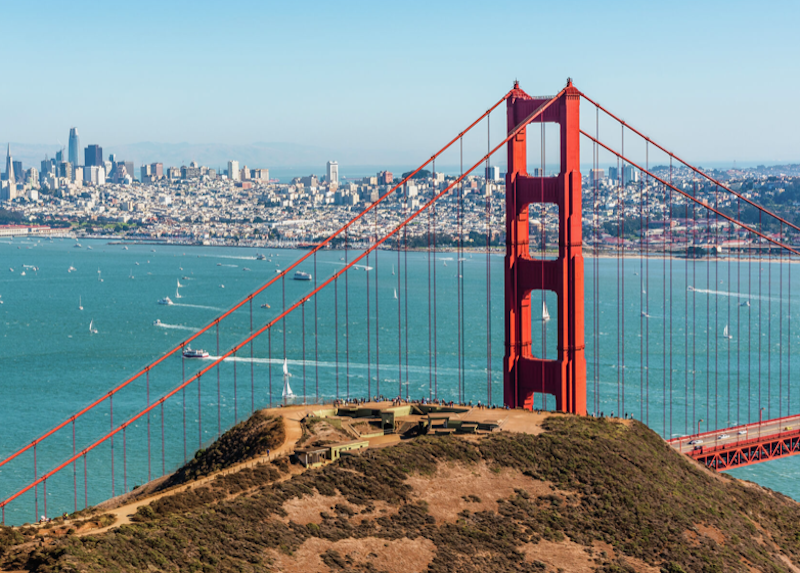One summer vacation, before I entered eighth grade, my family—eight people—drove cross-country and spent a week in Palo Alto at the home of family friends. One day, the four parents went off to San Francisco and returned with some photos that made me fall in love with the city. It looked magical. That bridge, the fog, everything. I was bitterly disappointed that I’d been left behind, and vowed to return to someday, which I did by moving there.
And what a place it was to live. I used to go to a place called Frank's Extra Bar in North Beach, where you could get great calamari and then shoot a game of pool. I learned about wine in San Francisco, and ate and drank at fine restaurants and bars, dumps and fancy places, all over the city. I went to Giants games at Candlestick Park, and spent many evenings at the bar of Jeremiah Tower's restaurant, Stars—the most exciting restaurant ever to open in the U.S.—where I was friends with all the bartenders. These memories give me comfort, but now I'm afraid to put them in jeopardy by going back to San Francisco, which is in a death spiral now, much of it unintentionally self-inflicted. I'd prefer to just look at my old photos and pretend nothing's changed.
Everybody knows what I'd see if I went to downtown San Francisco, where lawlessness has become the status quo. The shitty, needle-strewn sidewalks, the open drug use, the tents—all evidence of the street vibe that the criminals know they can get away with just about anything, a condition at the heart of the town's malaise that's driving major retailers out of the city and making so much office space lie dormant. Shopkeepers are no longer surprised when they get burglarized at night, and car break-ins are rampant, which keeps tourists away. The worst of this blight is in the downtown area called the Tenderloin, which isn’t far from Union Square, where the Four Seasons hotel is located. It's just a short walk from the luxurious to the squalid. But the Tenderloin, while seedy when I lived there, wasn't dystopian then.
San Francisco's been a boom or bust city since the time of the "forty niners," and it's in a bust cycle now, even though it has more billionaires per capita than any city in the nation. It's become the kind of progressive, clueless city that makes social-justice nerd Chesa Boudin DA, even though he doesn't want to arrest anyone in streets that’ve become unwalkable. That's because Boudin, who was raised by Weather Underground leaders Bill Ayers and Bernadine Dohrn after his left-wing-domestic-terrorist parents were sentenced to long prison sentences, is a "compassionate" person. San Francisco is the perfect example of how far down the tubes making compassion the main governing principle will get you.
The media says that San Francisco's misery is a three-pronged problem: homelessness, drug abuse, and mental illness. They leave out the fourth prong—an oversupply of misplaced tolerance and compassion—because those are supposed to be liberal values that could never do any harm. It's impossible to be too compassionate. Take a look at the episode of Anderson Cooper's documentary series on CNN, "The Whole Story," that was devoted to San Francisco's plight. San Francisco mayor London Breed getting interviewed in a friendly way dominated the program. It should’ve been called "Half of the Story."
Breed did criticize the woeful Boudin (he was recalled after two disastrous years, and is now the executive director of the new Criminal Law and Justice Center at UC Berkeley), and she did announce an emergency law enforcement initiative aimed at cleaning up the Tenderloin, but little has changed. When this sort of problem is left to fester for too long, a few hundred arrests barely moves the needle.
San Francisco residents—90 percent of whom voted for Biden—are confused about housing. They keep voting to pour more money into the homeless situation (the city has a massive $1.1 billion homeless budget), but it keeps getting worse. That's because of well-intentioned, but misguided programs like Housing First, which is dedicated to providing shelter to anyone who says they're homeless. The program puts the homeless into SROs with, as reported by the San Francisco Chronicle, "collapsing ceilings, toxic mold, vermin, noxious odors, constant noise, broken appliances, and unchecked violence." Drug abuse in these SROs also remains unchecked. Housing the untreated mentally ill and drug addicts means that they're likely to return to the streets soon.
The prognosis for San Francisco isn’t sanguine. Silicon Valley interlopers have put a squeeze on the housing market that's not going away. Programs like giving junkies free needles, which left-wing activists endorse, have exacerbated the problem. In fact, radical left-wing activists are mainly responsible for San Francisco 's open-air drug scene/camping in the streets. And since this is San Francisco, not Dallas or Miami, these activists will continue to be powerful.
San Francisco is a city that puts civil rights above all. This is what gets in the way of the only practical solution to the city's emergency. The drug-addicted and mentally-ill homeless should be put in shelters and told their reward for getting themselves fixed will be a place to live. Drug addicts would have to complete a rigorous stint in rehab. The mentally ill would have to enter a treatment facility. But San Francisco doesn't have the mentality for any kind of tough love.
After having been away from San Francisco for a number of years, I spent a couple of days there in the late-1990s. My hotel was in the downtown area, and I sensed a harshness that hadn't existed before. I had a couple of unpleasant interactions in the streets, one of them involving a guy, for no reason at all, threatening to punch me in front of a bar. Though I still had a good time, it felt this town had taken a turn for the worse, and now I see my instincts were correct.

